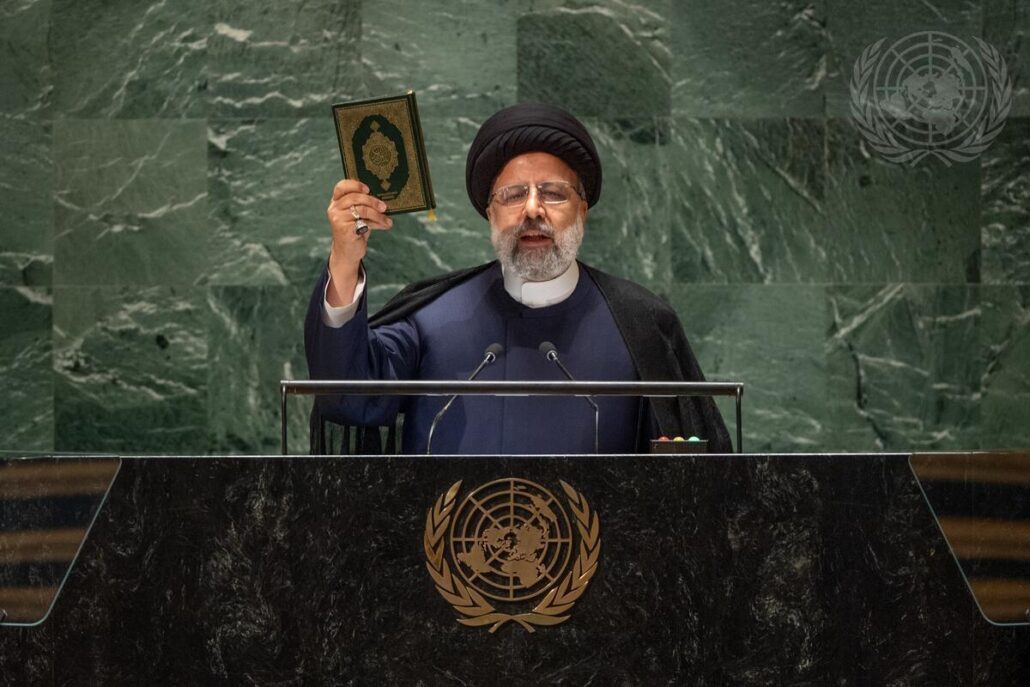
Iran’s President Ebrahim Raisi said the “world is changing” amid the emergence of a new international order and the “path is irreversible” in his speech at the UN General Assembly on Tuesday.
Raisi, who arrived in New York on Monday, used the platform of the annual premier conference of world leaders to attack the policies of Iran’s adversaries – the United States and its Western allies.
More than 140 world leaders and representatives are taking part in this year’s UN General Assembly session.
Raisi said the Western policy of domination is “no longer an answer for the world” and the old liberal order that served the ruling elites and capitalists has also been abandoned.
“The project to Americanize the world has failed,” he asserted, adding the “resistance and awareness” of nations has increased more than ever.
Taking a potshot at the European Union’s foreign policy chief Josep Borrell, Iran’s president said the West is faced with an identity crisis, as it sees the world “as a jungle” and itself “as a garden.”
He further said that Western democracy has “reached the end of its journey” and the people of West Asia know the “true meaning” of Western democracy – “coups, occupations and wars.”
Raisi stressed that his country advocates the policy of “economic convergence within the region and around the world” and is interested in “interacting with the world based on justice.”
“The school that wanted to be a model for the world has become a lesson and is nearing the end of its journey,” he asserted, referring to Western democracy.
Holding aloft a copy of the holy Quran, he denounced the recent cases of desecration of the Muslim holy book in some European countries, saying the Quranic teachings “will never burn.”
He decried Islamophobic acts such as the burning of the Quran in Sweden and the barring of hijab-clad girls from attending schools in France, noting that the Quran invites people to “spirituality, truth and morality.”
“The world is experiencing unprecedented changes. What is better than God’s word that can define human values?” said Raisi, urging the UN to prevent insults against the Muslim holy book.
“We believe that respect for divine religions should be included in the international agenda and the United Nations should guarantee respect for divine religions by designing a mechanism,” he said.
Raisi also referred to what he called the “war against the (institution of) family,” asserting that education and development “can only be achieved within the framework of a family.”
“The family is the most natural human institution that is under threat today. The attack on the natural shelter of the human being, the family, is a crime against humanity,” he noted.
He also commented on last year’s countrywide protests in Iran, which were triggered by the death of 22-year-old Mahsa Amini while in police custody and led to a long spell of unrest in the country.
Raisi said the Iranian nation was the “target of the biggest media and psychological war” last year and some Western countries and their intelligence agencies “made a miscalculation.”
Sept. 16 marked the first anniversary of the death of Amini and saw the US and European Union imposing fresh human rights-related sanctions on Iranian individuals and institutions.
Raisi said the Islamic Republic has been reeling under sanctions for the past 45 years, since the 1979 Iranian revolution, but the sanctions policy has “failed” and the Iranian nation has “won.”
He also commented on the protracted war in Ukraine, stressing that his country “does not support war anywhere,” echoing what he said in his interaction with journalists on Monday.
He said the rejection of any peace plan by the US suggests that it has a long-term plan for the insecurity of Europe, adding that Iran does not see the war in Europe in anyone’s interest.
On the standoff between Tehran and Washington over the 2015 nuclear accord, Raisi said the US withdrawal from the multilateral agreement was a “unilateral crime” and went on to slam European countries for failing to adhere to their commitments under the deal.
He added, however, that through trust building, the US needs to prove it has good intentions and a real will to fulfill commitments and finalize the path, referring to the prisoner swap deal, which many observers see as a hint at future talks between the two sides.
Raisi also decried Europe’s decision not to lift missile and nuclear-related sanctions on Iran that end in October this year, saying Europeans “will lose by speeding up on the costly path of confrontation.”
He hastened to add that Iran has “unique investment opportunities” and engaging in economic cooperation with the Persian Gulf nation is an opportunity for the countries in the region and the world.
“The Islamic Republic of Iran’s neighborhood policy is a benevolent policy for the region, and based on this, economic cooperation is at the top of the regional agenda,” he said, adding that the Islamic Republic “warmly shakes every hand that is extended for friendship.” — AA




